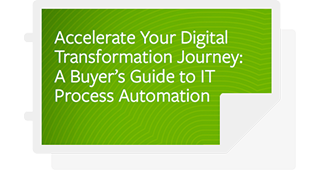For today’s enterprises, the time for pursuing digital transformation is now, if not yesterday. As they facilitate digital transformation for their businesses, IT operations teams will either be bolstered by strong IT process automation (ITPA)—or very much hindered by the lack thereof. In this post, we examine why ITPA is so integral to successful digital transformation, and we look at the key requirements that ITPA platforms must meet if they’re to fully support digital transformation initiatives.
Introduction: The Digital Transformation Imperative
For organizations in virtually any industry, digital transformation is a competitive imperative. Today, it falls to IT operations teams to make it happen. In many respects, the IT operations team’s ability to support digital transformation will play an increasingly central role in whether the business achieves its long-term goals and objectives.
However, while pursuing digital transformation is vital, it’s also ramping up the challenges. As digital transformation is pursued, IT teams are being forced to contend with these mounting demands:
- Increasing scale. Within most organizations, teams must support increasing volumes of users, applications, transactions, data volumes, and more.
- Increasing complexity. Compared to just a few years ago, operations teams have to manage far more complex environments, including a broader range of endpoints, a more diverse mix of application architectures, and an increasingly hybrid mix of on-premises environments, private clouds, and public clouds
- Increasing pace of change. To support digital transformation, teams need to accelerate the pace of innovation and new service delivery. At the same time, they have to keep pace with increasingly dynamic modern environments, including software-defined infrastructures, microservices, agile and DevOps approaches, and more—which all serve to dramatically speed the rate of change.
The Challenge: Labor-intensive Workflows a Massive Obstacle on the Digital Transformation Journey
As teams seek to pursue digital transformation and address the associated escalation in demands, they’re finding it tough sledding. That’s because, for too many organizations, automation has been employed in a limited, tactical fashion. As a result, teams continue to be mired in laborious, repetitive, and error-prone workflows. This leaves the organization exposed to spiraling costs, operational inefficiency, and increased risks of outages, breaches, and non-compliance. Ultimately, many organizations aren’t as far along in their digital transformation journeys as they need to be—and the competitive consequences of this reality can be dire.
Automation that Enables Digital Transformation: Key ITPA Platform Requirements
Quite simply, strategically implemented ITPA is a foundational requirement if teams are to meet their digital transformation objectives. As teams embark on their digital transformation journeys, having the right ITPA tools will be essential. To pursue their transformation initiatives, teams should look for platforms that offer the following advanced features:
Rich, Pre-packaged Samples and Templates
Given the urgency of digital transformation, teams need tools that can help them move quickly. Solutions that come pre-packaged with templates, samples, workflows, and more can therefore be invaluable. These resources help teams avoid having to reinvent wheel, which is vital to speeding implementations and time to value.
Broad, Flexible Integration
To deliver the highest strategic value to digital transformation initiatives, organizations need automation that can span technical and organizational silos. The Gartner report, “Market Guide for IT Process Automation,” advises that IT leaders should “Maximize automation investments by selecting ITPA tools that can orchestrate workflow execution across functional requirements, groups and management tools.” To address these requirements, solutions should offer pre-configured, automated integrations with a wide array of technologies and systems—including servers, applications, devices, and operations tools.
Artificial Intelligence and Machine Learning
For automation to deliver maximum support of digital transformation over the long term, teams need to harness ITPA platforms that offer extensive AIOps capabilities, including automation, artificial intelligence, and machine learning. My colleague, Monica Brink recently wrote a post that outlined how this combination yields significant dividends, such as enabling teams to realize up to 75% improvements in mean-time-to-resolution metrics.
It is only by leveraging these powerful capabilities that teams can begin to keep pace with massive volumes of operational data, and establish more complex automation in increasingly dynamic environments.
Conclusion
For some time, IT teams have been hampered by laborious, error-prone manual efforts. Now, these kinds of efforts will seriously jeopardize an organization’s chances at pursuing digital transformation. ITPA is now essential for teams looking to support digital transformation, and the right tools can significantly advance this cause. In addition, please register for our upcoming webinar, “Automated Operations for Proactive Event Remediation.”







